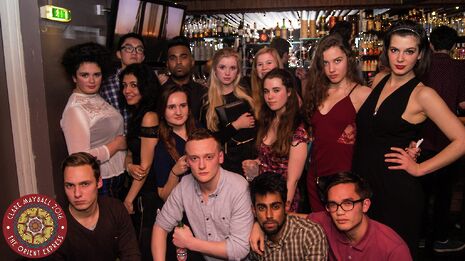An ‘Orient Express’ in sustainability
Emily Fishman interviews the Clare May Ball committee to find out how they are pursuing an environmentally-friendly approach to May Ball organisation

It's that time of year again: the summer blossom is out, students are busy revising in college libraries, and a sunny spell (or in our case a full on heatwave) offers a delightful preview exams ending, and May Week. Seven days of lavish excess, it is the epitome of a Cambridge student's end of exam term extravaganza. Yet this year, May Week is being approached differently by some.
The question of sustainability has brought a different set of agendas to the fore. Among the wider student body, environmentalism has become a focal point for activism and has permeated popular student culture, with film screenings and increasingly prominent marches for divestment. Some college catering departments, reacting to their ostensible environmental benefits, have started to offer vegan options.
This environmental focus is influencing the organisational aspect of May Week. For the first time, close attention is being paid to ensure that May Balls and June Events meet environmental targets. Committees have recently started implementing more sustainable strategies to their plans; the recruitment of sustainability directors to the committee is just one such example, which will hopefully ensure that future balls are both environmentally and socially responsible.
Meeting with the Clare May Ball team last week was a delightful opportunity to hear about their ambitious aim of creating a fully carbon neutral May Ball. Speaking to the two sustainability directors, Amy Carmichael and Alejandro Rivera, I discovered that much effort has gone into making the ball as eco-friendly as possible. For example, there has been an increasing emphasis on sourcing food and drinks from local producers, saving on transport and road miles.
The team are clearly passionate about their cause. Many of the ball's external suppliers didn't have sustainability plans, so the committee have proposed new ways in which they can improve their sustainability. The team seem prepared to take a holistic approach, and go the extra mile in order to make sure the ball is fully engaged with sustainability. Change may require a shift in thinking, and a little creativity, but – as Amy and Alejandro pointed out – other May Balls could quite easily introduce similar strategies.
This approach also has cost benefits. May Balls are not the cheapest events to organise, but the team suggested that by adopting more sustainable methods, such as recycling old props from previous May Balls, they could save money and afford to spend money on other more important purchases.
My favourite idea concerns ensuring that the waste generated by the ball is kept under control. This, at first, sounded like a rather dull effort of sorting and recycling, yet 'waste' applies not just to rubbish which guests generate. Often props, items, costumes, lights and decorations are thrown away. The Clare team, however, are preparing to run an auction of these assets, and donate all proceeds to charity. Not only is this an imaginative and creative way of dealing with waste, but it also fosters inclusivity, with even the waste of the ball going to a worthy cause. Collectivism and localism are key themes of the Clare May Ball, and are also essential to the wider environmental movement as a whole.
After finishing my chat with the team, I felt inspired and encouraged to pursue environmentally sustainable options myself. I feel May Week will be seen with a different perspective this year – a focus towards sustainable 'fun' is something which all May Ball teams need to adopt and pursue. As Clare have demonstrated, the steps taken to engage in environmental and social sustainability are in fact easy, affordable, and above all practical.
Cambridge should be leading the way towards a sustainable future. Amy said “many students, on May Ball committees or not”, will be influenced by sustainable approaches – and may take the lessons they learn forwards once they leave. Students’ impact, not just in Cambridge, but on a global scale, will make a difference. The impact of sustainable May Balls may resonate higher than just the ‘Cambridge bubble’.

I believe this year will be one of environmental awareness – Clare is leading the way in this regard, and their example should inspire others to rethink the purpose of May Week.
To find out more about Clare's sustainablity visit: http://www.claremayball.com
 News / Uni Scout and Guide Club affirms trans inclusion 12 December 2025
News / Uni Scout and Guide Club affirms trans inclusion 12 December 2025 News / Cambridge Vet School gets lifeline year to stay accredited28 November 2025
News / Cambridge Vet School gets lifeline year to stay accredited28 November 2025 News / Cambridge study finds students learn better with notes than AI13 December 2025
News / Cambridge study finds students learn better with notes than AI13 December 2025 Science / Did your ex trip on King’s Parade? The science behind the ‘ick’12 December 2025
Science / Did your ex trip on King’s Parade? The science behind the ‘ick’12 December 2025 News / Pembroke to convert listed office building into accom9 December 2025
News / Pembroke to convert listed office building into accom9 December 2025







